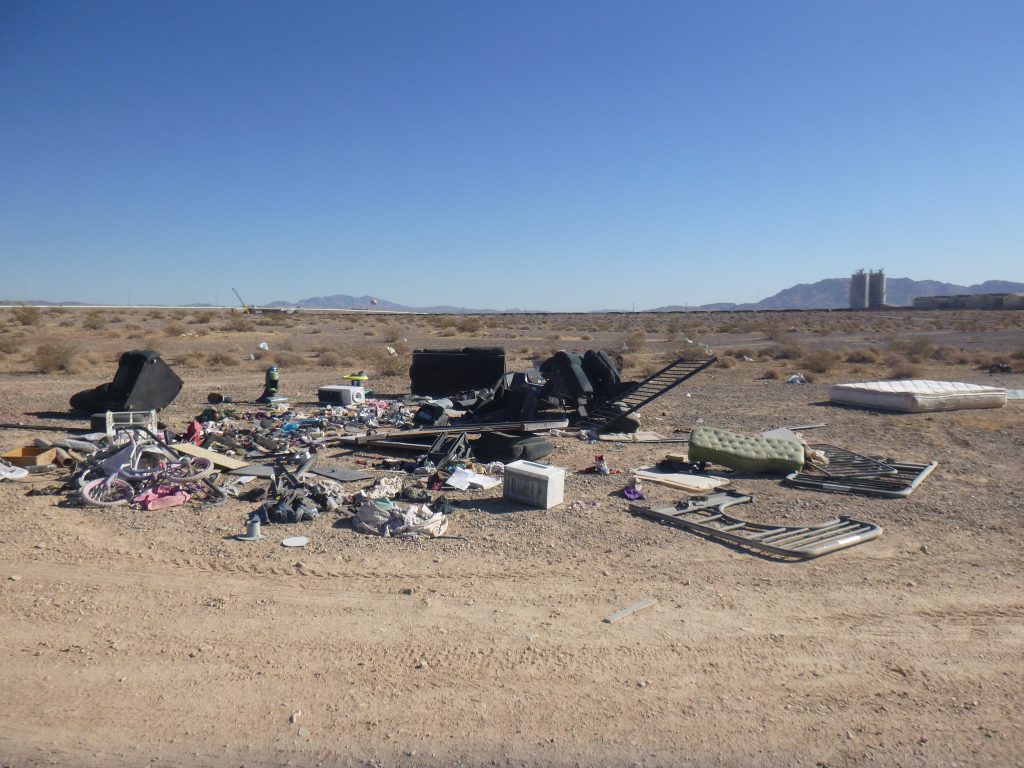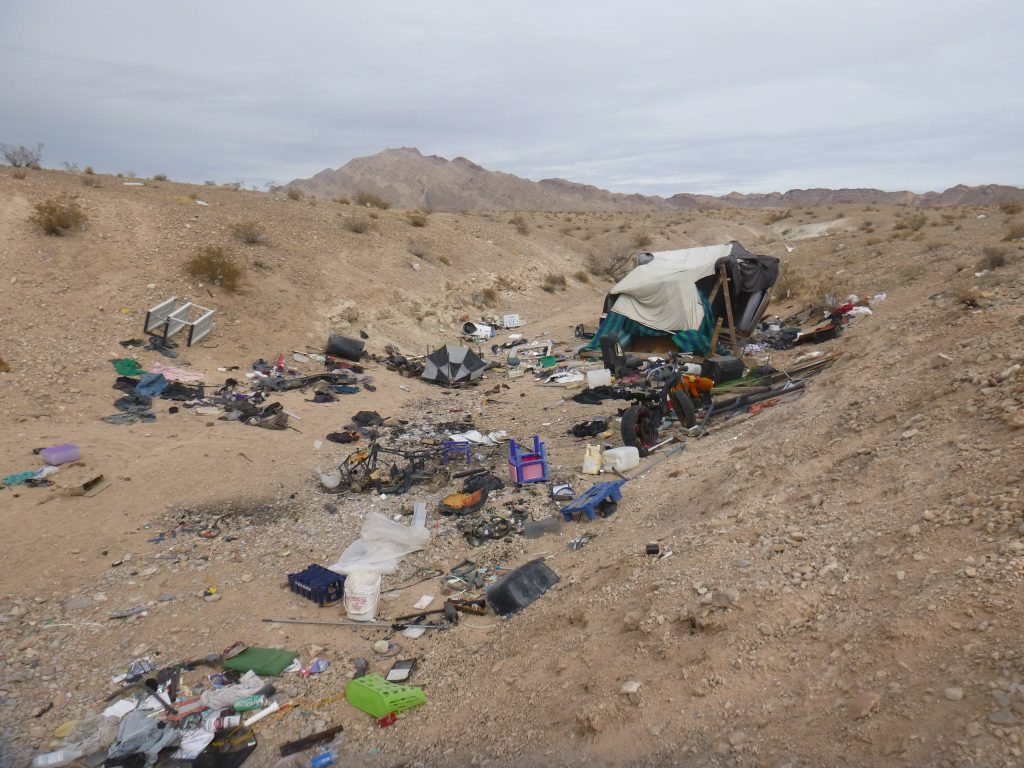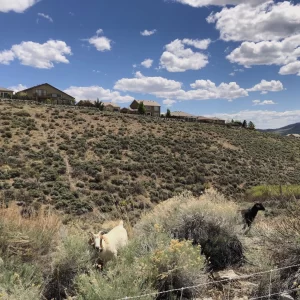
It’s easy to throw away everyday household waste, but what happens when broken appliances, old furniture or even hazardous waste need to be removed?
Unfortunately, some people resort to improper disposal of bulk items by illegally dumping them on public lands. Some bulk items include microwaves, refrigerators and mattresses.
Officials from the Southern Nevada Bureau of Land Management say that illegal dumping has increased during the COVID-19 pandemic. This spike in desert dumping has become harder to clean up due to resources and lack of volunteering during the pandemic.
“This last year, it’s been very hard to get large groups out because of COVID,” said John Asselin, the Bureau of Land Management’s public affairs officer for Southern Nevada.
Cleanup takes time and resources. Volunteers usually partner with the BLM to put a dent in these trash piles that surround the city, but the pandemic has hindered a lot of groups from coming together to do that work.
Southern Nevada is seeing more bulk items that aren’t easily disposable.
On the east side of Las Vegas, Asselin has seen an increase in boats, jet skis, yard waste and mattresses. The waste can be in any spot around the valley, and in some cases, 100 yards away from residential areas.
“The problem is you’ll clean up and it will fill up again about a week later,” Asselin said.
Yard and landscaping waste is also dumped. Asselin says a common assumption he has heard is that the landscaping waste will decompose, but that’s not the case.
“It’s the desert; it’s too dry; it doesn’t decompose,” Asselin said. “Your landscaping plants are not native to the desert, so when they get dumped … they take seeds with them, and those now compete with the native plants.”
BLM officials say unlicensed waste removal services in the Las Vegas area are also contributing to the problem. Not having the means to pay for the proper disposal of homeowners’ trash or landscaping waste, the BLM is finding that some of these companies are dumping the waste in the desert.
“If we find your name and address on something, our law enforcement will come and visit you,” Asselin said. “We’ve heard from people [saying] they paid a trash removal company, and then we are able to get information about the trash removal company … that’s how we find out about unlicensed contractors and unlicensed waste removal.”
Officials Say Education Could Reduce Illegal Dumping
Asselin says that education in this area is really important.
“Everything we do, we talk about ‘leave no trace’ principles,” Asselin said. “It’s really not about cleaning up; it’s about educating people that there is no one out there to clean up after you.”
Kendra Kostelecky with Waste Management in Reno said that proper disposal is critical in keeping communities clean.
“The average person doesn’t spend a lot of time thinking or talking about garbage,” Kostelecky said. “Even though a part of you knows your microwave doesn’t go in your trash cart … there’s no education, so where does it go?”
Kostelecky says that another problem includes people not wanting to pay the landfill to take their items. A resident of the Sparks area wrote that she recently was trying to get rid of two old freezers:
“It’s $52 per [freezer] to dump, and people who say they can [pick up the freezers] don’t,” a resident in the Sparks area said on Nextdoor, an app where neighbors can share community information.
This resident said they’ve tried reaching out to people to take their two freezers that don’t work anymore, but people flaked when it came time to pick up the appliances.

Cost Of Dumping May Deter Some
Customers with Waste Management in Washoe County have four free dump days included in their accounts. Any time of year, during regular business hours, customers can bring a truckload of waste to the dump for free.
Waste Management will still collect the electronic waste, but because electronics like computers and televisions create a different kind of environmental impact, they need to be disposed of another way.
Homeowners can also add up to six bags to their curb on their designated trash pick-up day during the months of May and November.
Beyond those free opportunities to dispose of waste, people have an option to pay a fee or risk a fine.
“You’re paying $900 if you get caught or $50 to get rid of it responsibly; there is no comparison,” Kostelecky said.
Where To Take Bulky And Hazardous Waste
On Waste Management website, residents can find information regarding bulk items, bulk pickup and the guidelines for hazardous waste.
Washoe County residents can take items to the Lockwood Landfill in Sparks, where gate rates are displayed to see the potential cost of specific items. Waste Management transfer stations are also capable of taking waste, with one location in Stead and the other on Commercial Row in Reno.
Commercial Row will also take recycling for free.
For bulbs, batteries and other electronics, Waste Management provides a mail-in option or an easy at-home collection service.
For other hazardous waste like paint, garden and pool chemicals, Waste Management provides front door pick-up or the option to drop off these items at a transfer station.
Residents in Clark County can go to Southern Nevada’s Republic Services website with questions about the disposal of bulk items, which include furniture, mattresses, construction waste and household appliances.
The Apex Landfill and recycling center has an option to take bulk items and recycling. It’s located on the city limits of North Las Vegas.
Most rural counties in Nevada have landfills of their own, and items can be dropped off for free or a small fee.
When looking for a location, residents in rural counties can enter their address or zip code on the website for either the Waste Management or Republic Services to find a trash removal service near them.
Emilie Rodriguez is a senior at the Reynolds School of Journalism. She is a student reporter with KUNR Public Radio and The Hitchcock Project for Visualizing Science.





